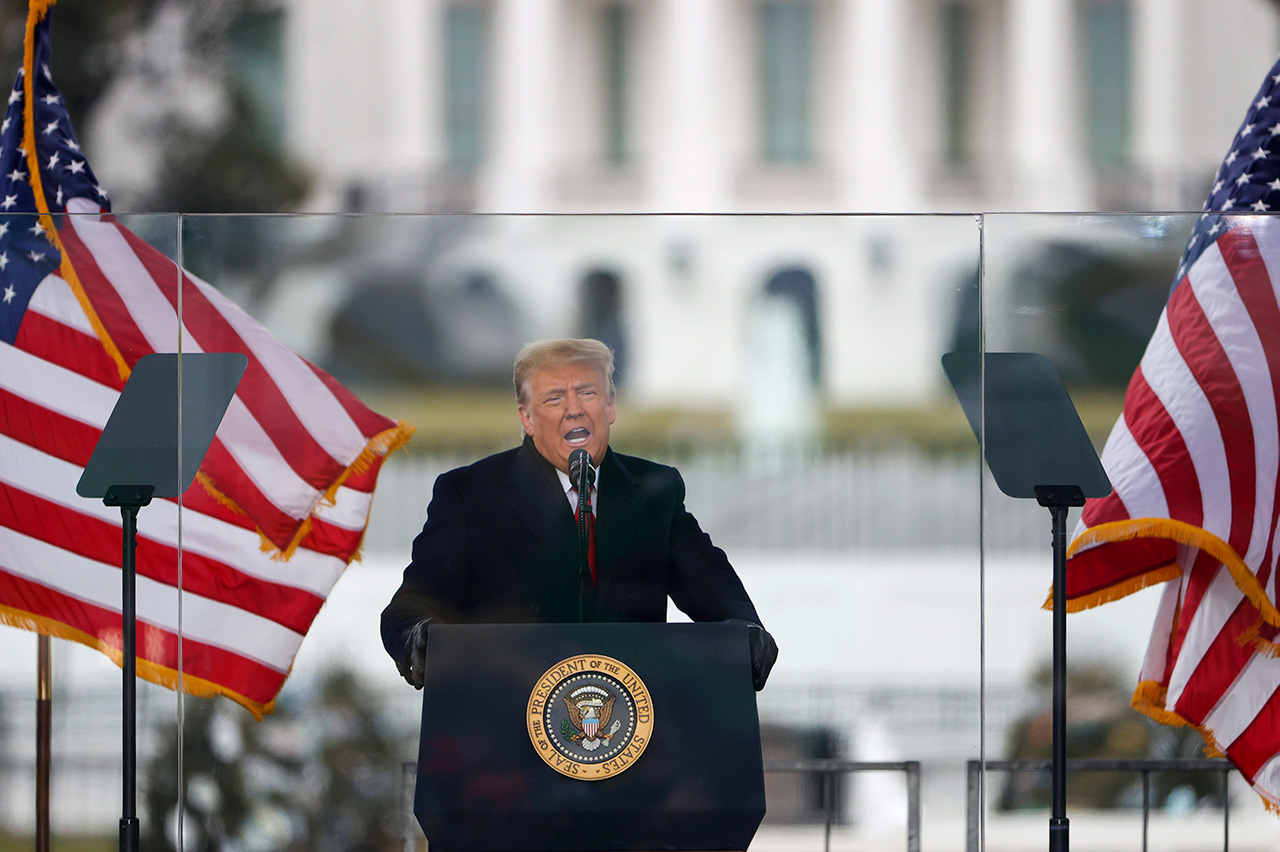Republicans should worry more about what’s right for the country than their own electoral futures.
On a business trip down South some years ago, I checked into the hotel and emailed my wife, who was back in New York. “When the GPS tells you to take Jefferson Davis Highway to Stonewall Jackson Boulevard and hang a left,” I wrote, “you know you’re a long way from home.”
Yes, the U.S. is a big country, and in some parts of it the defeat of the Confederacy is still a touchy subject, alas. Still, I’m inclined to believe that most Americans were appalled last week at the image of a man with a large Confederate battle flag strolling down the halls of the Capitol while a mob of Trump supporters were ransacking the place.
Since the 1960s, that flag has symbolized, among other things, opposition to civil rights for blacks. For many, it brings to mind white hoods, burning crosses and lynch mobs. In 2015, Justice Clarence Thomas, a product of the Jim Crow South, joined liberals to cast the deciding vote in a case that affirmed Texas’ refusal to print the Confederate flag on the state’s license plates. Yet its brandishing last week recalled what the flag originally stood for: insurrection.
Donald Trump encouraged his supporters to march to the Capitol and did little to stop them from interfering with Congress’s certification of Joe Biden’s victory. At the direction of the president, the executive branch of government tried to strong-arm the legislative branch. Even after the carnage that ensued, a large majority of Republicans in the House, including Minority Leader Kevin McCarthy, voted to do what the rioters demanded and challenge the election results. For shame.
Some Republicans have called on the president to resign, which is a pipe dream. Others have tried to have it both ways by saying that he deserves to be impeached but shouldn’t get what he deserves. The Senate won’t convict and the process will sow even more political discord, they argue, so let Mr. Trump serve out his few remaining days in office.
One problem with this reasoning is that the Constitution doesn’t condition impeachment on the timing of the offense or whether the process will prove divisive. Will future presidents be permitted to commit impeachable offenses, so long as they occur in the final weeks of a term? It’s always possible that things could get worse, but we’ve already seen a storming of the Capitol, a president who refuses to concede defeat, and 147 Republicans in the House and Senate who have voted to overturn the November election results. Will a second impeachment—this one actually warranted, by the way—be some sort of tipping point?
What really concerns Republican lawmakers is the party brand going forward. They are worried about their own political prospects post-Trump. A second Trump impeachment may indeed be bad for the country, broadly speaking, but it’s worse for the GOP. The Trump presidency has already cost Republicans the House, the Senate and—thanks to last week’s mob action—the moral high ground. The next president will have to deal with the fallout, but Joe Biden can be forgiven for not taking advice from Republican lawmakers on how to proceed.
Mr. Biden’s bigger problem may be that his calls for national unity conflict with the left’s increasing focus on identity politics. Already, his rhetoric on this front is worrisome. He joined a chorus of liberals who compared the siege on the Capitol to last year’s Black Lives Matter protests and suggested that law enforcement went easier on the former because the perpetrators were white. In fact, a white woman was shot dead by Capitol security last week, while no BLM protesters were killed by police.
Mr. Biden also erred in announcing that his economic “priority” as president will be “Black, Latino, Asian and Native American owned businesses.” If Mr. Biden means that literally, his administration will be in violation of the Civil Rights Act of 1964, which prohibits racial discrimination. But even if he doesn’t mean it literally, how are white business-owners—many of whom have been devastated by the pandemic—supposed to react to this sort of pandering?
If we’ve learned anything from the past two administrations, it’s that a president’s musings about race can matter enormously. Race relations plummeted during President Obama’s second term, thanks in part to his response to high-profile police shootings, and they’ve continued to deteriorate under President Trump. California, the nation’s most populous and racially diverse state, soundly rejected a ballot measure last year that would have reinstated racial preferences in college admissions and hiring. Mr. Biden, who campaigned on unity, might keep that result in mind. If he’s serious about trying to bring us together, he’ll focus on the ideals that unite us as Americans and not on using his presidency to play favorites or exploiting our racial and ethnic differences to score political points.
This piece originally appeared at The Wall Street Journal (paywall)
______________________
Jason L. Riley is a senior fellow at the Manhattan Institute, a columnist at The Wall Street Journal, and a Fox News commentator. Follow him on Twitter here.
This piece originally appeared in The Wall Street Journal
